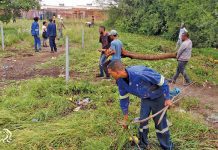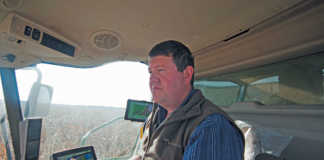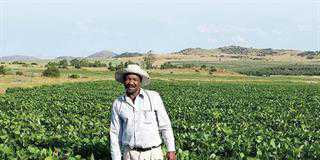Farmers have been suffering accusations of human rights violations of employees. However, an Agri Wes-Cape survey last year revealed that most farmers in the Western Cape invest more in their labourers than required by law. Glenneis Erasmus reports on one farming family’s commitment to uplift and empower its workers.
The Rossouw family, which has been producing grapes at Mooigezicht Estates in the Hex River Valley since 1928, runs one of the most successful grape-producing operations in South Africa.
They are the largest producer of the Crimson Seedless – one of the most sought-after red cultivars in the market – and the leading red grape producer in SA. In addition to being highly market-orientated, the group also places a high premium on production efficiency. The estate, which consist of nine farming units spanning 250ha of vineyard, produces around 1,2 million 4,5kg cartons of grapes per year, of which around 1,1 million are exported to locations all over the world from the UK to the East, and even Africa. The rest is sold domestically. Secret to the success F rancois Rossouw, managing director of Mooigezicht Estates, claims it is the group’s workforce. “Our workers are our largest asset. Without them, the use of the latest technology or best cultivars will mean nothing. We, therefore, invest a lot of time and effort to create an environment that fosters a healthy work ethic.”
Eight of Mooigezicht Estates’ nine farm units have fully developed infrastructure consisting of cold-storage facilities, sorting and packing machinery, as well as residential infrastructure for workers and management, including day care centres for workers’ children, and medical facilities. The group employs over 1 000 of which 450 are permanently employed, and provides housing to 170 families.
The fact that human resources are regarded as one of the greatest assets of the operation is reflected in the housing provided to workers. Each house has the basic necessities – water, electricity, flush toilets and washing facilities – but they are also larger than the traditional RDP houses. Every house has its own colourful garden and is burglar-proof. Most of the residents have television and some have DStv.
Education also receives high priority. “We believe that empowerment starts with education. Therefore, the group provides its employees with access to training programmes. Providing people with land or money can impoverish instead of empowering them, if they don’t have the skills or assets to invest or develop these resources,” says Nico Verster, who is responsible for human resource development at Mooigezicht. The estate has its own training centre where a range of personal development courses are offered. These include personal, neighbourhood and farm safety; financial and business management; educare and childminding; first aid, personal hygiene, human sexuality and STDs; fire management; life-skills training for teenagers; and leadership training. The technical courses include orchard management, mechanics, water management, plant nutrition and computer literacy.
Many of these courses are offered in close cooperation with government departments, NGOs or other non-profit organisations. Thirty employees are currently attending literacy courses, and the group ultimately aims to attain a 100% literacy level on the farms. There are three computer rooms with computer facilities where 135 people are receiving computer training. The group is involved in a needlework baby-care bag project. The estate donated sewing machines, overlockers and other resources to a group of women on the farm who have been trained to make baby bags. The finished bags are bought by sponsors sought out by the directors of the estate, and are filled with maternity and baby products. These bags are then donated to disadvantaged mothers before they leave hospital.
The Rossouws place high value on family development and health. This is illustrated by the 172 employees who last year completed a comprehensive course on foetal alcohol syndrome and good parenting skills. “We believe the family is the cornerstone of society – workers with low self-esteem and morale who are unhappy with themselves and experience domestic problems, will be less efficient in their work and personal relations than workers who are happy,” Francois explains. Courses are offered to enhance the spiritual development and to foster the spiritual needs of employees. But participation in all courses and activities is still voluntary.
Assessing workers’ abilities
Work satisfaction is important to the group, and a thorough analysis of worker abilities and potential is done to ensure workers are applied in the areas where they will be most effective. The company conducted a comprehensive analysis of all employees last year, and identified 24 employees with the potential to become farm managers with the ability to run an operation independently. A career plan has been developed for these workers to help develop their potential, and nine of them are now completing a national diploma course in plant production. The estate acknowledges that its employees need to have the assurance that their children are safe during working hours by providing day care facilities. These facilities are more than your ordinary day care centre as children are intellectually stimulated and receive a formal education programme to prepare them for school. Most of the facilities provide porridge for breakfast, and sandwiches and fruit for lunch as part of a feeding scheme. Some of the facilities also have computers and provide computer literacy classes.
Emphasising the importance of education, the company encourages learners as far as possible to complete their school career. The group is proud of the 11 children who successfully completed their matric in 2005 and the six who passed matric last year. Tertiary education is encouraged through a bursary scheme. Mooigezicht in partnership with Dole fully sponsored two students’ study costs of R15 000 each last year. Nico says, “Several of the employees’ children go to universities, technikons or colleges, and many of them return to come and work on the farm.”
Acknowledging their contribution
Workers are rewarded when the farm performs well financially through profit sharing. They receive a percentage of the profit as a bonus to reward them for their contribution to the operation’s success, Nico explains. Through all these endeavours, the estate has managed to attain 65% on the BEE scorecard.
The healthy relationship between the estate and its employees is reflected in the company’s low annual employee turnover – less than 2% – with many workers completing a 45-year service period. The fact that more than one generation works at the farm is a tetimony to the strong bond between workers, their families and the farm. “Farmers must understand that the empowerment of workers and the community is not only helping to secure these people with a better future, but it also helps to improve farm, and ultimately industry sustainability,” Francois says. |fw













